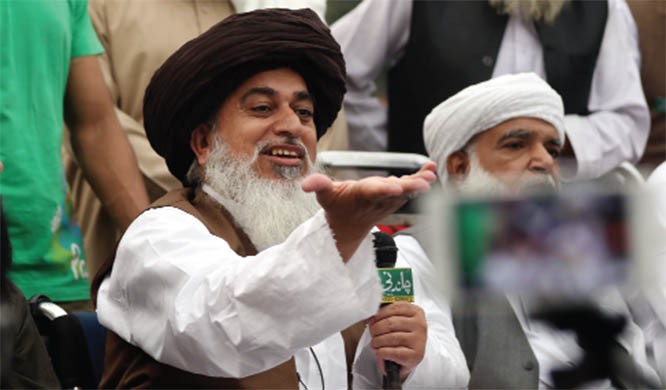
Two firebrand religious leaders, Khadim Hussain Rizvi and Pir Afzal Qadri, get bail as evidence evades the prosecution

The Lahore High Court (LHC) has granted bail to Tehreek-e-Labbaik Pakistan (TLP) chief Khadim Hussain Rizvi and former TLP patron-in-chief Pir Afzal Qadri in a case registered against them for launching a violent three-day protest in October, 2018 against the acquittal of Aasia Bibi from a blasphemy charge.
On November 23, 2018 under the MPO (Maintenance of Public Order Ordinance, 1960) Civil Lines Police, Lahore had registered an FIR under sections 290/291/353/427/186/188 of the Pakistan Penal Code (PPC) and section 6 of the Sound System Punjab Ordinance 2015 against TLP leadership that included Rizvi, Qadri, Allama Farooqul Hassan and Allama Aijaz Ashrafi. Section 7 of the Anti-Terrorism Act (ATA) 1997 was later added to the FIR and 1,135 people were arrested, including the TLP leadership.
Section 7 of ATA is important. It says: "A person who does anything likely to cause death or endangers life, or grievous damage to property is caused by his/her activity, shall be punishable on conviction, with imprisonment of either description for a term which shall be not less than ten years but may extend to imprisonment for life and with fine."
Based on the ATA section, the government decided to try the detained leadership of the Tehreek-i-Labbaik Pakistan (TLP) in special anti-terrorism courts on charges of sedition and terrorism: for delivering anti-state speeches and inciting violence during the three-day protests.
November 24 onwards, the TLP leadership filed several bail pleas in the Anti-Terrorism Court but they were rejected each time. On May 1, 2019 Pir Afzal Qadri resigned from the TLP for health reasons and, on the court’s earlier directions, issued a public apology for his remarks. Nevertheless, the two-member LHC bench, comprising Justice Qasim Ali Khan and Justice Asjad Javed Ghural rejected this apology and directed Qadri to file a more detailed one.
In the meantime, the prosecutor could not file a charge sheet against Tehreek-e-Labbaik Pakistan (TLP) chief Allama Khadim Hussain Rizvi, Pir Afzal Qadri and others for making speeches against national institutions and for hooliganism during protests. Therefore, on May 14, the bail plea was accepted and the LHC bench granted pre-arrest bail to both Rizvi and Qadri till July 15.
Senior lawyer and one of the complainants against the TLP, Abdullah Malik, calls it a shame that prosecution could not build a solid case against those facing charges of fuelling violent protests, inciting followers to damage property and for hate speeches targeting state institutions. "There is enough proof available that could have been presented before the honourable court to prevent them from taking a pre-arrest bail."
However, former secretary Supreme Court Bar Association Aftab Bajwa believes that every accused has the right to obtain bail. "There are several aspects that must be highlighted to observe the logic behind granting bail to the TLP leadership. For instance, the prosecutors were not trained enough to build a solid case in the anti-terrorism courts; the government was unable to give protection to witnesses; day-to-day hearings which are obligatory in anti-terrorism cases were not held - undoubtedly the government is responsible for this case."
There is talk in concerned circles that the TLP leadership was released on post-arrest bail after successful behind-the-scene negotiations with the government. Apparently, the federal government allowed the bail plea of the two TLP leaders after being assured that TLP would accept the Supreme Court’s (SC) verdict on Aasia Bibi, and that though they will be allowed to hold peaceful demonstrations and conferences, they will refrain from issuing decrees or proclamations that classify people as ‘wajibul qatal’ or ‘kafir’.
According to Abdullah Malik, "the government has again taken a U-turn on this very serious case by not defending it on merit". He thinks the government has staged the TLP leaders’ release on bail - "Proofs of hate speech, threats to the government, judges and army generals have not been submitted before the court. The honourable court asked the prosecution several times to submit a city-wise damage report. But the report never came about."
Malik believes the major takeaways of the Faizabad sit-in case penned down by Justice Qazi Faez Isa, and the detailed verdict of Mumtaz Qadri’s case authored by Justice Asif Saeed Khosa, have been set aside by the prosecution "most certainly under the will of the government."
Considering the lack of evidence against the two firebrand religious leaders the honourable court granted bail to Rizvi on merit and Qadri on medical grounds against surety bonds worth Rs5 million each. Aftab Bajwa holds that an accused can acquire bail on medical grounds "if there is no treatment available in prison".
Blasphemy is a massively inflammatory issue in Muslim-majority Pakistan, where even unproven allegations of insulting Islam and Prophet Muhammad (PBUH) can lead to lynching and murder. Based on newspaper reports, between 1990 and present, at least 74 people have been killed for committing blasphemy and between 1987 and 2016, 1472 people have been charged under the blasphemy laws.